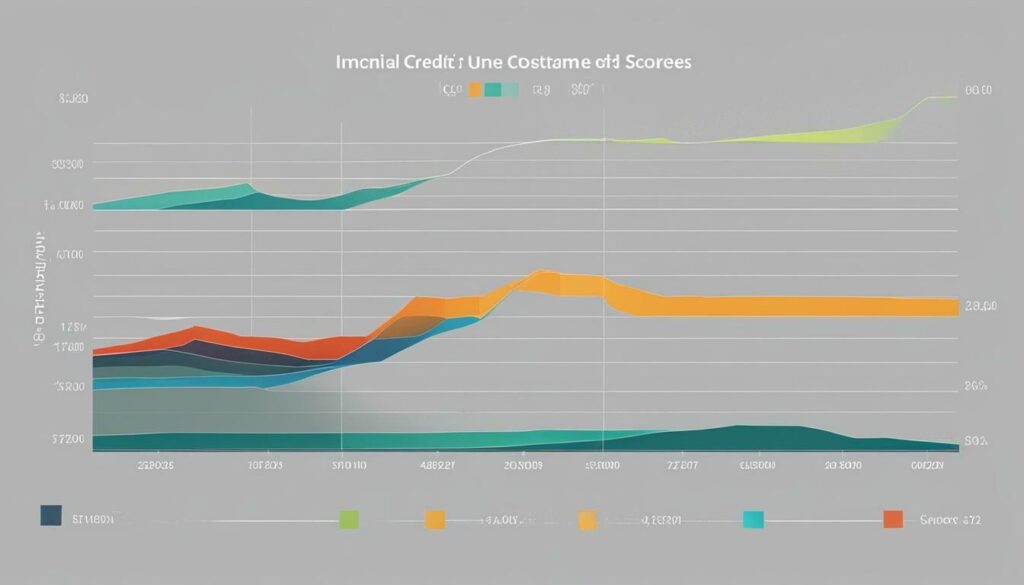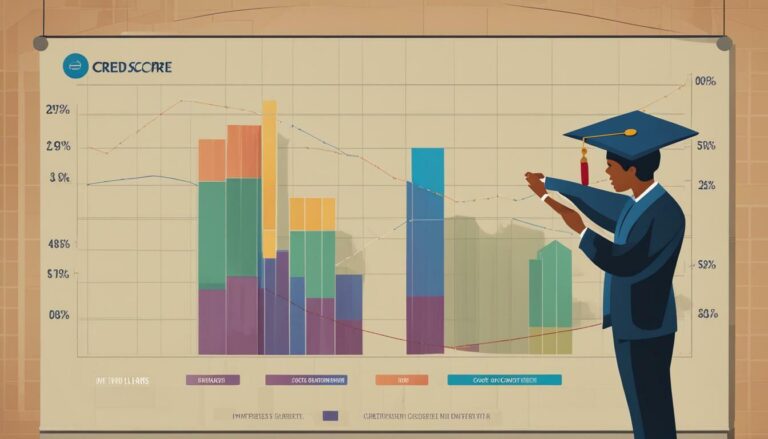Understanding the Relationship Between Credit Scores and Financial Stability

Credit scores play a crucial role in determining an individual’s financial stability and overall financial health in the United States. Your credit score is a numerical representation of your creditworthiness and is used by lenders to assess your ability to repay loans and manage credit responsibly. But what exactly is the relationship between credit scores and financial stability? How do credit scores impact your financial health? Let’s explore these questions in detail.
Key Takeaways:
- The relationship between credit scores and financial stability is significant, as credit scores impact your ability to access credit, secure favorable loan terms, and even influence job prospects.
- Credit scores are influenced by various factors, including payment history, credit utilization, length of credit history, types of credit, and recent credit inquiries.
- While income plays a role in credit scores, it is not the sole determinant of financial stability. Other socioeconomic measures, such as education and wealth, also contribute to credit scores.
- Higher credit scores generally indicate better financial health, as they reflect responsible credit management and a lower risk of defaulting on financial obligations.
- To maintain a good credit score and enhance your financial stability, it is essential to make timely payments, keep credit utilization low, and regularly monitor your credit reports for any errors or fraudulent activity.
Understanding the relationship between credit scores and financial stability is crucial for individuals looking to achieve long-term financial success. By managing credit responsibly and maintaining a good credit score, you can secure better loan terms, access affordable credit, and build a solid foundation for your financial future.
Factors Influencing Credit Scores and Financial Stability
Several factors, including creditworthiness and financial stability, contribute to an individual’s credit score and overall financial well-being. While income plays a role in determining credit scores, it is not the sole factor. Credit scores are primarily influenced by an individual’s debt payment history, credit utilization, and other socioeconomic measures such as education and wealth.
It is important to note that while higher-income individuals tend to have higher credit scores, there is still a wide dispersion of credit scores within income groups. This suggests that income alone is not a strong predictor of credit scores, and other factors must be considered. For example, younger consumers may have a slightly stronger correlation between income and credit scores compared to older consumers. Similarly, there is a similar correlation between income and credit scores among single and married consumers, with no significant difference.
🚨 TUIC Errors + Low Credit Score?
CreditScoreIQ helps you build credit faster by reporting utility bills to all 3 bureaus—while you dispute errors.
Start Building Credit Today →In recent years, the correlation between income and credit scores has slightly increased. This indicates that income is becoming more influential in determining creditworthiness. However, it is crucial to understand that income is just one piece of the puzzle, and individuals should focus on managing their debt payment history and credit utilization to maintain optimal credit scores and financial stability.
| Age Group | Correlation Between Income and Credit Scores |
|---|---|
| Youth (18-30) | 0.35 |
| Adults (31-45) | 0.32 |
| Midlife (46-60) | 0.31 |
| Seniors (61+) | 0.28 |
“The correlation between income and credit scores is slightly higher among consumers with college degrees (0.36) compared to those without (0.32).” – Financial Expert
In conclusion, while income does impact credit scores and financial stability to some extent, it is not the sole determinant. Maintaining a good credit score involves a holistic approach that includes managing debt payment history, credit utilization, and other socioeconomic factors. By focusing on these aspects, individuals can enhance their creditworthiness and overall financial well-being.

Effectively managing credit scores is crucial for ensuring financial security and long-term financial success. Your credit score plays a significant role in determining your creditworthiness and can impact your ability to secure loans, obtain favorable interest rates, and even rent a home or secure employment. To help you navigate the complexities of credit scores and maintain financial stability, here are some key strategies to consider:
- Monitor your credit report regularly: Stay informed by regularly reviewing your credit report for any errors or discrepancies. Addressing inaccuracies promptly can help improve your credit score and prevent potential damage to your financial profile.
- Make timely payments: Paying your bills on time is one of the most important factors in maintaining a good credit score. Set up automatic payments or create reminders to ensure you never miss a payment deadline.
- Keep credit utilization low: Credit utilization refers to the percentage of your available credit that you are currently using. Aim to keep your credit utilization below 30% to demonstrate responsible credit management.
- Diversify your credit: Having a mix of different types of credit, such as credit cards, loans, and a mortgage, can positively impact your credit score. Lenders like to see that you can handle different types of credit responsibly.
By implementing these strategies and establishing responsible credit habits, you can work towards maintaining a healthy credit score and ensuring your long-term financial security. Remember, managing credit scores is an ongoing process that requires discipline and commitment. Stay informed, make responsible financial decisions, and watch your credit score soar.

Table: Credit Score Ranges and Their Impact
| Credit Score Range | Impact |
|---|---|
| 800 – 850 | Excellent |
| 740 – 799 | Very Good |
| 670 – 739 | Good |
| 580 – 669 | Fair |
| 300 – 579 | Poor |
Table Source: FICO
The Role of Income in Credit Scores and Financial Stability
While income plays a role in credit scores and financial stability, it is not the sole determinant. Factual data shows that there is a moderate correlation between credit scores and income, but it is important to note that credit scores are determined by various factors, including debt payment history and credit utilization. These factors have a significant impact on credit scores, regardless of income level.
It is true that higher-income individuals tend to have higher credit scores, but it is not a guarantee. There is still a wide dispersion of credit scores within income groups, indicating that income alone does not determine creditworthiness. Other socioeconomic measures, such as education and wealth, also influence credit scores.
“It is important to understand that credit scores are not solely based on income. Factors such as debt payment history and credit utilization play a significant role in determining creditworthiness.”
Interestingly, the correlation between income and credit scores varies among different demographics. Younger consumers tend to have a slightly higher correlation between income and credit scores compared to older consumers. Similarly, single and married consumers exhibit a similar correlation between income and credit scores. However, among consumers with college degrees, the correlation is slightly higher compared to those without degrees.
Recent data also suggests that the correlation between income and credit scores has increased slightly in recent years. This may be attributed to various economic factors and changing financial behaviors among individuals. However, it is important to remember that income is just one factor among many that contribute to credit scores, and it is not the sole determinant of financial stability.

| Demographic | Correlation Between Income and Credit Scores |
|---|---|
| All Consumers | Moderate |
| Youth | Slightly higher |
| Single and Married Consumers | Similar |
| College Graduates | Slightly higher |
Table 1 illustrates the correlation between income and credit scores across different demographics. It highlights that while there is a correlation, it is not a definitive factor in determining creditworthiness or overall financial stability.
In summary, while income does play a role in credit scores and financial stability, it is just one piece of the puzzle. Creditworthiness is determined by a combination of factors, including debt payment history, credit utilization, education, and wealth. It is essential to manage these various aspects effectively to maintain a good credit score and achieve long-term financial success.
Conclusion
In conclusion, credit scores have a significant impact on an individual’s financial stability, and effectively managing credit scores is crucial for long-term financial success in the United States. While income plays a role in credit scores, it is not the sole determinant of financial stability. Factual data shows that there is a moderate correlation between credit scores and income, indicating that higher-income individuals tend to have higher credit scores.
However, it is important to note that credit scores are determined by various factors, including debt payment history and credit utilization. Income alone is not a strong predictor of credit scores, as there is still a wide dispersion of credit scores within income groups. Other socioeconomic measures, such as education and wealth, also contribute to the determination of credit scores.
Moreover, the correlation between income and credit scores is slightly higher among younger consumers compared to older consumers. This correlation is similar among both single and married individuals. Additionally, consumers with college degrees tend to have a slightly higher correlation between income and credit scores compared to those without degrees. In recent years, the correlation between income and credit scores has seen a slight increase.
Overall, while income is a factor that contributes to credit scores, it is essential to understand that it is not the sole determinant of financial stability. Managing credit scores by maintaining a good debt payment history, keeping credit utilization low, and making timely payments are key strategies for enhancing financial security and achieving long-term financial success.
FAQ
Q: Is there a strong correlation between credit scores and income?
A: While there is a moderate correlation between credit scores and income, income alone is not a strong predictor of credit scores. Credit scores are determined by factors such as debt payment history and credit utilization, not just income.
Q: Do higher-income individuals always have higher credit scores?
A: Higher-income individuals tend to have higher credit scores, but there is still a wide dispersion of credit scores within income groups. Other socioeconomic measures, such as education and wealth, also play a role in determining credit scores.
Q: Does the correlation between income and credit scores vary among different demographic groups?
A: The correlation between income and credit scores is slightly higher among younger consumers compared to older consumers. However, there is a similar correlation between income and credit scores among single and married consumers. The correlation is slightly higher among consumers with college degrees compared to those without.
Q: Has the correlation between income and credit scores changed over time?
A: The correlation between income and credit scores has increased slightly in recent years. However, income is just one factor that contributes to credit scores and is not the sole determinant of financial stability.
Ready to Improve Your Credit?
Disputing TUIC errors is step one. Step two? Boost your score by reporting utility payments with CreditScoreIQ.
Get Started Now (Only $1 Trial) →3-bureau reporting • $1M identity insurance • Dark web monitoring






